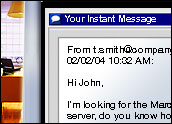
Despite red-alert headlines about hackers, worms and viruses, and despite the threat of identity theft and misappropriation of personal data, many home computer users have yet to invest in the first line of defense against external attacks: a firewall.
“Currently, only about 55 percent of antivirus customers have a firewall installed,” James Schmidt, product manager for the McAfee Personal Firewall (MPF) product at McAfee Security, told the E-Commerce Times. This figure is troubling, considering that it takes into account only people who already have purchased antivirus software. In other words, these are the people who are concerned about Internet security. Statistics among the larger population of all Internet users likely are far more dismal.
Consumer resistance to personal firewalls especially poses a threat to the growing number of home users who tap into the Internet via always-on — and therefore always vulnerable — cable or DSL modems. In May, 39 million U.S. residents, or 13 percent of the total population, connected to the Internet via broadband from home, according to Internet traffic measurement firm Nielsen//NetRatings. This figure marked an increase of 49 percent from the year-ago period, though broadband is still far from dominant; NetRatings found that 69.6 million Americans continue to access the Web via dial-up modems.
Why are consumers so resistant to adopting personal firewall software, and will that change as broadband adoption increases?
Firewalls 101
Developers are stepping up their efforts to educate consumers about the capabilities of personal firewall software and the necessity of installing it on their PCs. Earlier this month, for example, Symantec and Microsoft unveiled a plan to create various educational and promotional programs to inform users about simple measures they can take to safeguard their computing experience.
“It really is an ongoing educational process, with the message being conveyed through a number of channels,” including general and business media, advertising campaigns and marketing promotions, according to Stephen Gohres, vice president of marketing for Computer Associates’ My eTrust product line.
Meanwhile, Don Hoyt, a marketing associate at firewall vendor Deerfield.com, told the E-Commerce Times that the situation may be improving. “Detrimental viruses, hackers and additional Internet-related security threats are currently receiving a huge amount of exposure from national news organizations,” he said. “Very few consumers who own a computer haven’t heard of Nimda or Code Red. These security threats are exposed everywhere, and the knowledge of the threats that all Internet users are exposed to is what is needed to inspire the installation of firewall products.”
Technological Jumps
Vendors also are taking steps to reduce the complexity of installing firewalls, according to Michael Rasmussen, an analyst at Forrester Research. “People are starting to become aware of the terminology, aware of the issues,” he told the E-Commerce Times. “Often, though, they don’t understand antivirus versus firewalls. Symantec and Network Associates are promoting more of a suite [approach].”
With a suite, users can install antivirus, antispam, firewall protection, privacy blocking and other security-related features via one CD-ROM instead of four or five, he said. So, if a user were to buy an antivirus program, he or she also would get a personal firewall, among other protective software.
McAfee’s Schmidt added that pricing is another advantage of many security suites. “All products combined in a suite are less expensive than buying the products piecemeal.”
At some point, in fact, antivirus and firewall software could become one, addedCA’s Gohres. “There definitely seems to be a convergence going on, so maybe in a year or so [developers will] meld firewalls and antivirus software,” he told the E-Commerce Times. “You maybe wouldn’t call it your antivirus firewall. You’d call it something like your Internet defense solution.”
Hard-Wired
Some software developers also are fighting the personal firewall battle on another front — by working with PC makers to preinstall firewall applications. “Many hardware vendors are currently including firewall software on new PCs that leave the factory,” Schmidt noted.
In September, for instance, Intel presented one of its Intel Innovative PC Awards to the Lenovo YangTian S6000, a small-form-factor PC that includes a preinstalled personal firewall and a hidden hard drive partition that lets users protect important information from intrusion or accidental deletion.
The Right Route?
Of course, users also have the option of using a router to help protect their data. But one of the benefits of firewall software is its portability, especially when the home computer is a laptop.
“I definitely prefer the personal firewall software for two reasons,” said Forrester’s Rasmussen. “Routers are good for network attacks. [However,] firewalls on routers for personal use only offer a small level of security. [Software provides] much more fine-grained control.”
Also, when a user prefers to tap into a hotspot at a local coffee shop rather than log on at home, his or her laptop is secure if it is running firewall software. “The software firewall goes with you,” Rasmussen noted.
Crystal Ball
Pundits and executives alike predict the number of firewall software installations will increase, though they expect a steady climb rather than a dramatic leap. “The percentage increase will most likely mirror its current state but [run] parallel with the adoption of broadband connections,” said Schmidt.
Deerfield.com’s Hoyt agreed. “I believe there will definitely be an increase, but it will most likely be gradual,” he said. “The importance of firewall usage will coordinate with the amount of risks associated with Internet connectivity. And since there are no signs of security threats slowing, I believe that firewall usage will be similar.”
So, unless they are prepared to accept the ever-increasing risk of suffering at the hands of hackers, worms or viruses, home users eventually must take advantage of the wealth of security options available. If they do not, they likely will suffer the consequences.
























































Social Media
See all Social Media